☆ PuniPuni Youtube ☆
Japanese Grammar – 〜たり〜たりする – Review Notes
Today, we will learn how to use 〜たり〜たりする (~tari ~tari suru) to list representative activities. In order to understand today’s grammar, you will need to have knowledge of the plain past form of verbs also known as た-form.
If you don’t know this, please see this other lesson first: http://www.punipunijapan.com/japanese-ta-form/
………………………………………………………………………………..
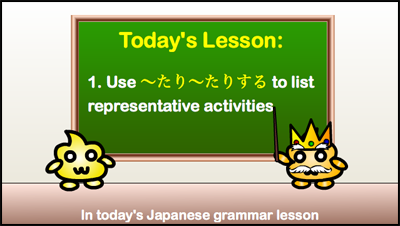
★ Today we will learn how to list representative activities using 〜たり〜たりする (~tari ~tari suru).

★ To understand today’s grammar, you will need to first understand the plain form of verbs. Check out this lesson first: http://www.punipunijapan.com/japanese-ta-form/
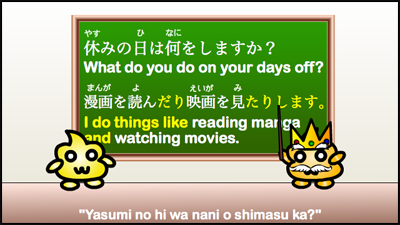
★ First, let’s see an example conversation.
休みの日は何をしますか?
Yasumi no hi wa nani o shimasu ka?
What do you do on your days off?
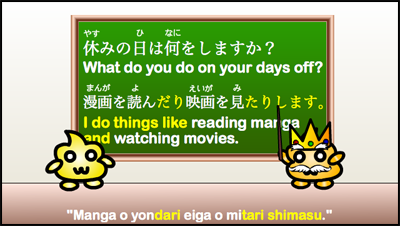
漫画を読んだり映画を見たりします。
Manga o yondari eiga o mitari shimasu.
I do things like reading manga and watching movies.
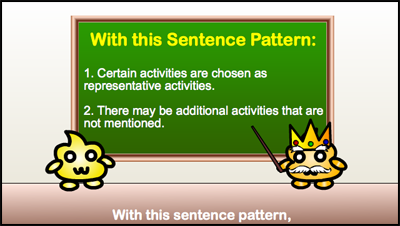
★ With this sentence pattern, certain activities are chosen as representative activities.
★ There may be additional activities that are not mentioned.
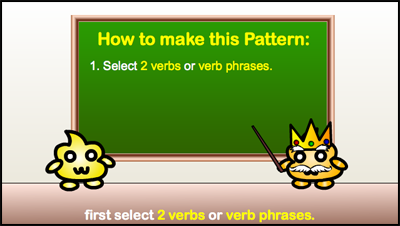
★ Let’s learn how to make the pattern! First, select 2 verbs or verb phrases.
★ Some examples of verbs include 寝る (neru – “to sleep”), 食べる (taberu – “to eat”), 飲む (nomu – “to drink”). Some examples of verb phrases include テレビを見る (terebi o miru – “to watch television”) and 買い物に行く (kaimono ni iku – “to go shopping”).
★ This time, let’s select テレビを見る (terebi o miru – “to watch television”) and 買い物に行く (kaimono ni iku – “to go shopping”)
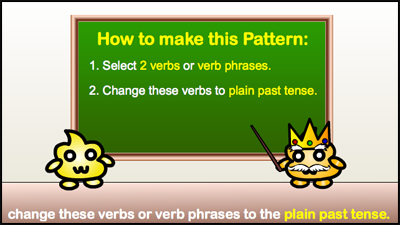
★ After you select 2 verbs or verb phrases, you must change them to plain past tense.
★ If you don’t remember how to do this, please check out our other lesson here
★ The two verb phrases we chose above would change to テレビを見た (terebi o mita – “watched television”) and 買い物に行った (kaimono ni itta – “went shopping”)
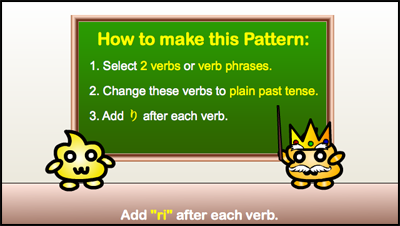
★ Next, we need to add り (ri) after each verb.
★ テレビを見たり買い物に行ったり (terebi o mitari kaimono ni ittari)
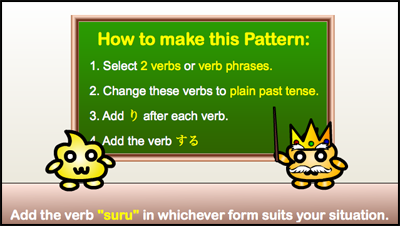
★ Finally, we add する (suru).
★ テレビを見たり買い物に行ったりする (terebi o mitari kaimono ni ittari suru) – “I do things like watching television and going shopping”
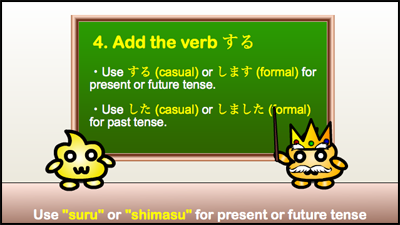
★ For present or future tense, use する (suru – casual) or します (shimasu – formal)
★ For past tense, use した (shita – casual) or しました (shimashita – formal)
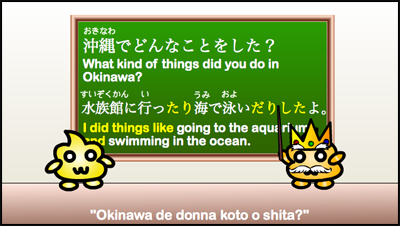
★ Let’s see an example of this sentence pattern in past tense.
沖縄でどんなことをした?
Okinawa de donna koto o shita?
What kind of things did you do in Okinawa?
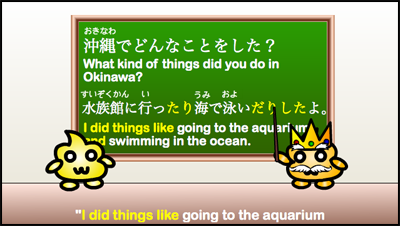
水族館に行ったり海で泳いだりしたよ。
Suizokukan ni ittari umi de oyoidari shita yo.
I did things like going to the aquarium and swimming in the ocean.
………………………………………………………………………………..
Making a Question (Do you do things like~?):
★ You can also use 〜たりする (~tari suru) to ask someone if they do things like~. In this case, usually only one ~tari is used.
漫画を読んだりしますか。
Manga o yondari shimasu ka?
Do you do things like reading manga?
★ This can also be translated simply as “do you read manga?”
………………………………………………………………………………..
Negative Form:
★ You can also use the negative form of 〜たりする (~tari suru) to say that you don’t (won’t) do things like~. For example:
笑ったりしないよ。
Warattari shinai yo.
I won’t laugh (or make fun of you).
★ This phrase is often used when you are trying to get someone to tell you something but they are hesitating because they think you will laugh at them or make fun of them. Literally, it means “I won’t do things like laugh” but the meaning is “I won’t laugh (or make fun of you)”.
……………………………………………………………………………….
The Anime “Tari Tari”
This is the ending song from the anime “Tari Tari”. If you listen to the lyrics, you can hear today’s grammar!
……………………………………………………………………………….
Conclusion:
That’s it for today’s Japanese grammar lesson! If you have any questions, please leave a comment below!
……………………………………………………………………………….
Do you want a Japanese tutor?
Take Japanese Skype Lessons with Professional Japanese Teachers on kakehashijapan.com!
………………………………………………………………………………..
………………………………………………………………………………..









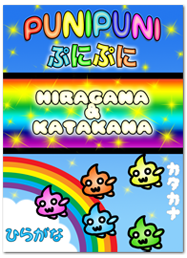
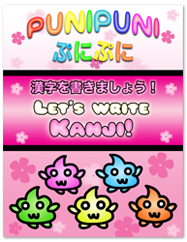


0 comments